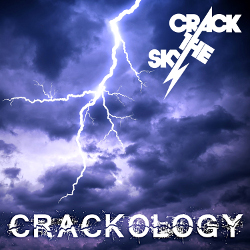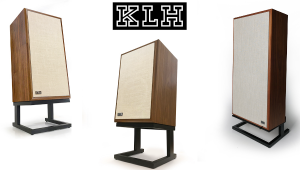Crack The Sky Move Forward by Living in Reverse
Sometimes, you really do need to look back in order to see where you’re going next. It’s a mantra the Weirton, West Virginia-bred rock outfit known as Crack The Sky have been following for years. Their long-perfected inherent knack for knowing how to incorporate that patented, melodically driven Crack crunch with ever-evolving sonic ideas and inventive, hook-laden sound palettes have won them a fervent fan base, and you can often hear prescient, hard-driving vintage Crack cuts like “Nuclear Apathy” on SiriusXM’s Deep Tracks channel.
To keep things moving in the right direction, Crack The Sky have set their sights at both ends of their career telescope with a pair of smashingly satisfying concurrent releases, both via Loud & Proud Records. Living in Reverse showcases 12 new genre-defying Crack tracks, while the oh-so-cleverly-titled retrospective Crackology chronicles a dozen re-recorded gems culled from the band’s rich and storied 40-year catalog.
“We’ve been going back in time to try and find ourselves, even while we’ve been looking ahead to the future,” observes guitarist/producer Rick Witkowski. “On our first few albums, we were labeled as a guitar-driven, classic-rock, prog-rock kind of band, but each song on the new album has its own unique identity. Basically, we were on an audio exploratory mission.” Adds lead vocalist/chief songwriter John Palumbo, “Eventually, you find that everything comes full circle, so it’s fair to say we’ve been quite reinvigorated as artists these past few years.”
 Indeed, galvanizing Living in Reverse cuts like the full-on groundswell of “Raining Rain,” the modernized new-wave sonic uniform that envelops “Jacket,” and the spoken-word seduction of “Home Tonight” all match up quite beautifully with the recast Crackology versions of Crack classics like the one-two punch ’n’ crunch of “Hold On” and “Surf City” alongside the overdriven depth of “Skin Deep” and the reactor-fueled crackle of the aforementioned “Nuclear Apathy,” the latter track as relevant today as when it was first written and performed in 1978. “They have more of an edge than the originals,” Palumbo affirms of the even-dozen cuts on Crackology. “Those tracks all have more life to them now, and we play every one of them live.”
Indeed, galvanizing Living in Reverse cuts like the full-on groundswell of “Raining Rain,” the modernized new-wave sonic uniform that envelops “Jacket,” and the spoken-word seduction of “Home Tonight” all match up quite beautifully with the recast Crackology versions of Crack classics like the one-two punch ’n’ crunch of “Hold On” and “Surf City” alongside the overdriven depth of “Skin Deep” and the reactor-fueled crackle of the aforementioned “Nuclear Apathy,” the latter track as relevant today as when it was first written and performed in 1978. “They have more of an edge than the originals,” Palumbo affirms of the even-dozen cuts on Crackology. “Those tracks all have more life to them now, and we play every one of them live.”
Witkowski, 65, and Palumbo, 67, got on the line with me from their respective West Virginia homebases to discuss the collaborative symbiosis of their in-tandem sonic Crack attack, how important The Beatles remain in their respective creative DNA, and how embracing the past sets them up for a bright future. Surf City, here comes the sharks. . .
Mike Mettler: Because you guys have worked together for so long, the songs on Living in Reverse sound like they all come from an intuitive creative shorthand.
John Palumbo: That’s right. What happens with all of the songs is, I’ll deliver a complete track with everything on it, and then the guys go ahead and tear them apart in the studio. Rick and Bobby [Hird, Crack’s second guitarist] will start putting all the guitars together, and they’ll just start to color things. It’s a great way to work because everybody trusts everybody else — and that’s key. Usually, I write the music first, and then I put the lyrics in. I sit back after I’ve put them down and I go, “Whoa, that’s really some personal stuff.” They come out that way because I’m a mechanic just letting it all flow right through me, and I don’t really reckon I want to hide anything. (slight pause, then in a whisper) I just let it go.
Rick Witkowski: One thing I love most about John is he’s always into trying new things. There were hardly any guitars on most of the demos he was sending us for this record. They were full-blown productions with mostly all keyboards on them, and Bobby and I would take them and flesh them out. John would tell me, “Make them into Crack The Sky songs,” and that’s what we did — we just attacked them and added the signature Crack The Sky guitar stuff to them. I love the fact that he trusts me to do that.
 Mettler: It’s a worthwhile process, because I think a record like Living in Reverse encompasses all that you’ve learned in 40-something years of what you’ve worked through together. Of course, you still have to put the right bed tracks down to make sure John’s intentions as a songwriter come across as envisioned.
Mettler: It’s a worthwhile process, because I think a record like Living in Reverse encompasses all that you’ve learned in 40-something years of what you’ve worked through together. Of course, you still have to put the right bed tracks down to make sure John’s intentions as a songwriter come across as envisioned.
Witkowski: Yeah, we do. John, he gives me full rein to take a song where it goes, but ultimately, it has to fit what he wants as the writer. When you can run the gamut that way both sonically and emotionally, it makes a record so much more entertaining. He does have to sign off on it and we have gone back and forth on a few things, but in general, we have a pretty good relationship.
Mettler: Is there one good Living in Reverse song that’s the template that you guys back-and-forthed on to get it to the end result?
Witkowski: Well, the song “Hit” is a good example. And we do want a hit record!
Mettler: Yeah, who doesn’t? (both laugh) “I want a hit!”
Witkowski: John was talking about wanting a hit record, and Bobby said, “Why don’t you write a song about it?” And John brilliantly came up with drawing the analogy of, “I want a hit” with a hit of dope. It started as a “I need that adrenaline rush” kind of thing, and then he turned it around to, “I want a hit record.”
Palumbo: “Hit” is obviously a double-entendre. It’s written kind of tongue-in-cheek about having a hit of pot, but then if you let it go for a while, you recognize what it is — the guy’s looking for a hit record. Then I follow it up with the resulting track, “I’m On the Radio, Mom” — (sings), “I wrote this simple song,” and there it is! (chuckles)
Witkowski: I had the middle section of “Hit” all in my head. The song John sent me was all linear; it didn’t have that break in the middle. It had the same beat, over and over. I said, “We gotta put a little break in there to Crack the Sky-it up.” He wasn’t sure about it, but I said, “Trust me.” When it came to the part with the bridge where it gets real big, we do the little guitar thing. I recreated that by making a hole in the track there, and inserted that little section into what he had. I had to pitch down his track to do it. The whole thing was all in one key, the key of D. I just physically inserted the pitch-corrector and turned it into a little bridge, and brought it back up. At first, John wasn’t crazy about it, but when he heard it finally done, he went, “Aw, yeah, yeah.” It worked very well.
Mettler: It sure did. That kind of hit-driven writing style is in your musical DNA.
Witkowski: Have you ever seen that movie, That Thing You Do!?
Mettler: Oh yeah, the Tom Hanks movie [released in 1996]. It’s one of my favorites about the innocence of young bands making music in the 1960s. Well, maybe it’s not all that innocent, but still. . .
Witkowski: Yes, yes, you got it! Well, I grew up in that era. I wanted to play drums when I was about 12 years old and my parents said, “We’ll buy you drums if you take lessons.” I was so intimidated. I lived in Weirton, West Virginia, and we were very sheltered. I finally got a guitar at age 16, a [Gibson] SG, and I didn’t even know you could bend guitar strings until much later.
Mettler: What records were your personal touchstones back in those days?
Witkowski: Well, I do remember trying to play along to The Beatles’ “I Feel Fine” [released as a single in November 1964]. I tried to copy Ringo [Starr] by playing on the bell of the cymbal, and the toms.
And, of course, there was [1968’s] The White Album. It’s just all over the place, but it’s so entertaining that way. You go through the gamut with that album, sonically and emotionally, and that makes a record so much more entertaining. We try to do that too. The theory is, you get ’em in with one style, then you take your fans wherever you want to go. We never really got our fans to do that, though. (chuckles)
Mettler: John, when you were growing up as a kid, what was the first album you got that had the most impact on you?
Palumbo: Well, the first album I ever got, my mother bought me. It was [January 1964’s] Meet The Beatles. I just played the hell out of it on a little record player. Everything was mono, of course, and that just knocked me out. It was the first one, and I owe it for getting me into music.
Mettler: I know you’ve worked with Yoko Ono on a number of her remix projects in recent years. Did you ever meet The Beatles themselves?
Palumbo: We ran into John [Lennon] and Yoko a few times when we lived in New York. I was at the Grammys one time, and he was there [in 1975, when Lennon presented Record of the Year with Paul Simon]. This was later, when he was making himself public again. I was sitting behind him, or was he sitting behind me? We just say hi: “Hi John.” “Hi.” (chuckles)

Mettler: Do you have a favorite John Lennon song you’d like to cover someday?
Palumbo: No, I wouldn’t cover a Lennon song. That’s kind of untouchable. I know if he were still around, he’d feel that was ridiculous. He’d say, “It’s just a song.”
Mettler: I can respect that. How do you listen to music these days?
Palumbo: I have a turntable and just a few special records that I listen to. When I do listen, I’m usually writing.
Mettler: I read that you were a fan of Steely Dan. Is that still true?
Palumbo: I love Steely Dan, yeah. Especially the older stuff.
Mettler: Aja (1978) is still one of the best-sounding albums I’ve ever heard.
Palumbo: Yeah. When I hook up a new system, that’s what I usually put on, to make sure everything is sounding like it should sound. That’s the record I use. Oh yeah, it’s great, great stuff. I also demo with Emitt Rhodes, a songwriter who kinda disappeared. [Rhodes was a member of the Southern California garage band The Palace Guard and psych-rock band The Merry-Go-Round in the 1960s, and then he had a brief solo career in the early 1970s.]
Mettler: I remember him. He resurfaced a few years ago with an album called Rainbow Ends [in 2016], with artists like Roger Joseph Manning Jr. and Aimee Mann on it.
Palumbo: Oh yeah? I didn’t know that. I’ll have to look that up.
Mettler: Oh, I think you’ll enjoy it. In listening to a classic Crack song like “Hot Razors in My Heart” [from 1980’s White Music], I feel there’s a direct lineage between that and the evolution I hear on Living in Reverse’s “Raining Rain.” Another example of you taking chances is a new track like “Jacket,” which has a cool, modern new-wave vibe to it, if you don’t mind me saying so.
Palumbo: Oh no no, that’s pretty accurate. Yeah, I like that song. That’s really a departure for us, but I think that’s really good for us to do. That’s what I meant by stretching out. No one who knows the band would think that was Crack The Sky.
Mettler: As an artist, you don’t want to keep doing the same thing over and over. You want to build on stuff like “From the Greenhouse” and “Rachel,” latter-day Crack tracks that show how you’re evolving into the modern age.
Palumbo: Yeah, you want to keep growing. There’s no point in putting out new music if you’re not growing. In my opinion, David Bowie was the best at that. He kept going and going and going, and I just think that was wonderful. Sometimes you fall flat, but you have to not be afraid to fall on your face.
Mettler: Rick, to sum things up, what do you hope people will get out of listening to the Crackology collection?
Witkowski: Since we know there are so many people who never even heard those early records of ours, we’re hoping we can bring in a whole new generation of fans who may have passed us by. The fans who we already have are going to love this, because we capture the vibe and style of the old recordings, but they definitely have a little more edge to them. It’s where we’re at now. It will make our older fans happy because they’ll have updated versions of our older stuff, and hopefully it’ll bring in new people who’ve never heard this stuff before, and it will introduce them to what we used to be! (chuckles) We’re looking back to see where we’re going. That is the concept we’re going for.
Mettler: I think I get it — you’re living in reverse to move forward. (both laugh) John, what’s your take on Crack The Sky’s future? What’s your plan?
Palumbo: When it’s time to work, I know it’s time to work. And when it’s time to lay on the couch, then I’ll do that. (chuckles) I try to keep an open recorder around in order to get to new stuff pretty quick. If something comes up, I put it down somewhere. I mean, I’m a musician. This is what I do. It just keeps feeding the guys. As long as we continue to work well together, that’s what we’ll do.
- Log in or register to post comments































































